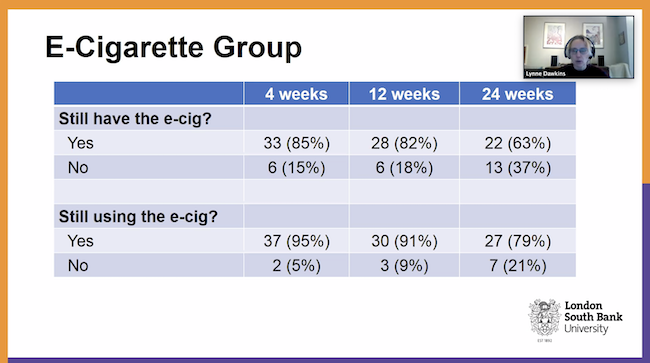Martin Dockrell chaired said he had been getting exceptionally excited about the event due to his experience with combatting HIV and then tobacco harm reduction: “A lot of my work in HIV was with gay men, drug users, street prostitutes – the most disenfranchised of the public. The smoking burden similarly falls most heavily on the most disadvantaged and excluded.”
He delighted in the fact that modern approaches to tobacco harm reduction had moved away from the old top-down, paternalistic approaches. Martin also welcomed that all the speakers were women and, in turn, the fact that women have feminised the approach and changed the all-male culture that previously dominated.
Martin introduced the first speakers, Lynne Dawkins, now a professor at London South Bank University doing “really interesting work” on electronic cigarettes, and Alison Ford, University of Stirling, who produces “beautiful, nuanced research”.
Lynne introduced her research looking at 52 research studies on homeless communities accessing smoking cessation services. She mentioned how smoking rates are “exceptionally high” among the homeless and that most of the studies came from America – only one came from Europe and that was from the UK.
“We’ve really overlooked these people.”

The interest in quitting smoking was “quite high” and similar to that found in the general population, “many had tried to quit in the past”. She found that vaping was the most popular route to quit but the price of a starter kit was prohibitive for the homeless. Results showed the most they could afford would be £5.
A secondary barrier was that smokers hang around with other smokers and that prevents successful quitting.
“We wanted to know if people would be willing to take part, to accept an offer of a free e-cigarette? And, if they took part, would they be able to keep hold of it? Would it get broken or stolen? And, if they did keep hold of it, would it help them quit?”
They allocated whole centres to either e-cigarette groups or usual care. This was done to prevent jealousy between clients receiving different care.
Centres were spread about the country and included one in Northampton, a country now making great strides in using vaping to combat the blight of tobacco addiction and disease.
For the NRT group, “we adapted a ‘10 Tips To Help You Stop Smoking’ factsheet and included lots of information about the local stop smoking service”. The vaping device was an Aspire Pocke-X kit with a tips and tricks sheet and their choice of juice.
The average number of cigarettes smoked per day by those taking part in the study was a pack of 20 per day.
Recruitment to the project was described as “good”, but retention drop-off was noticeable in the NRT group from 12 weeks. More people were using an e-cigarette than still had their original one. Lynne found this positive because although loses occurred due to breakages, participants were so motivated they replaced it with their own choice of a vaping device.
Was it a success?
Sustained abstinence from smoking was shown to be over three times better than NRT use in the general population – a resounding success for vaping.
Also, funders initially expressed fears that vaping would lead to drug use or the devices adapted to consume drugs. Lynne was proud to say that nothing like this was reported.
The article will be updated with a link to the presentations when the video is placed online.
Photo Credit:
Image by Quinn Kampschroer from Pixabay
Dave Cross
Journalist at POTVDave is a freelance writer; with articles on music, motorbikes, football, pop-science, vaping and tobacco harm reduction in Sounds, Melody Maker, UBG, AWoL, Bike, When Saturday Comes, Vape News Magazine, and syndicated across the Johnston Press group. He was published in an anthology of “Greatest Football Writing”, but still believes this was a mistake. Dave contributes sketches to comedy shows and used to co-host a radio sketch show. He’s worked with numerous start-ups to develop content for their websites.
Join the discussion
Come To GFN24!
Everyone is going to be welcome at #GFN24 as organisers say it will be an “antidote” to clandestine WHO COP10 and its meetings behind closed doors
Innovations for GFN 2024
The Global Forum on Nicotine is set to build on previous triumphs with further innovations for the 2024 event and is setting itself up to be the best one yet
GFN24 – Booking Open
From the moment GFN23 finished, the organising team began to work on next year’s event, and are delighted to announce that the website is now open for online registration and ticket booking
The Summer of the Pouch
With British music festivals asking attendees not to bring vapes, this has turned into a summer of tobacco-free pouches for music lovers












